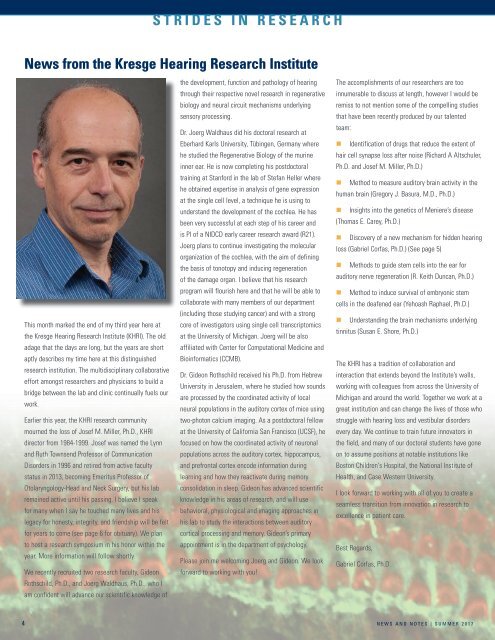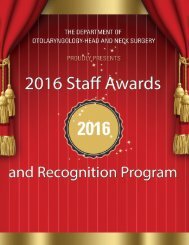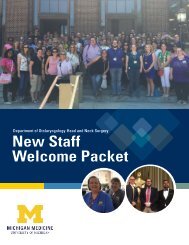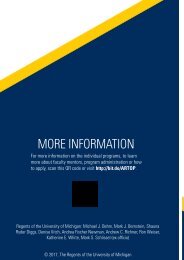News and Notes: 2017 Summer Newsletter
Create successful ePaper yourself
Turn your PDF publications into a flip-book with our unique Google optimized e-Paper software.
STRIDES IN RESEARCH<br />
<strong>News</strong> from the Kresge Hearing Research Institute<br />
This month marked the end of my third year here at<br />
the Kresge Hearing Research Institute (KHRI). The old<br />
adage that the days are long, but the years are short<br />
aptly describes my time here at this distinguished<br />
research institution. The multidisciplinary collaborative<br />
effort amongst researchers <strong>and</strong> physicians to build a<br />
bridge between the lab <strong>and</strong> clinic continually fuels our<br />
work.<br />
Earlier this year, the KHRI research community<br />
mourned the loss of Josef M. Miller, Ph.D., KHRI<br />
director from 1984-1999. Josef was named the Lynn<br />
<strong>and</strong> Ruth Townsend Professor of Communication<br />
Disorders in 1996 <strong>and</strong> retired from active faculty<br />
status in 2013, becoming Emeritus Professor of<br />
Otolaryngology-Head <strong>and</strong> Neck Surgery, but his lab<br />
remained active until his passing. I believe I speak<br />
for many when I say he touched many lives <strong>and</strong> his<br />
legacy for honesty, integrity, <strong>and</strong> friendship will be felt<br />
for years to come (see page 6 for obituary). We plan<br />
to host a research symposium in his honor within the<br />
year. More information will follow shortly.<br />
We recently recruited two research faculty, Gideon<br />
Rothschild, Ph.D., <strong>and</strong> Joerg Waldhaus, Ph.D., who I<br />
am confident will advance our scientific knowledge of<br />
the development, function <strong>and</strong> pathology of hearing<br />
through their respective novel research in regenerative<br />
biology <strong>and</strong> neural circuit mechanisms underlying<br />
sensory processing.<br />
Dr. Joerg Waldhaus did his doctoral research at<br />
Eberhard Karls University, Tübingen, Germany where<br />
he studied the Regenerative Biology of the murine<br />
inner ear. He is now completing his postdoctoral<br />
training at Stanford in the lab of Stefan Heller where<br />
he obtained expertise in analysis of gene expression<br />
at the single cell level, a technique he is using to<br />
underst<strong>and</strong> the development of the cochlea. He has<br />
been very successful at each step of his career <strong>and</strong><br />
is PI of a NIDCD early career research award (R21).<br />
Joerg plans to continue investigating the molecular<br />
organization of the cochlea, with the aim of defining<br />
the basis of tonotopy <strong>and</strong> inducing regeneration<br />
of the damage organ. I believe that his research<br />
program will flourish here <strong>and</strong> that he will be able to<br />
collaborate with many members of our department<br />
(including those studying cancer) <strong>and</strong> with a strong<br />
core of investigators using single cell transcriptomics<br />
at the University of Michigan. Joerg will be also<br />
affiliated with Center for Computational Medicine <strong>and</strong><br />
Bioinformatics (CCMB).<br />
Dr. Gideon Rothschild received his Ph.D. from Hebrew<br />
University in Jerusalem, where he studied how sounds<br />
are processed by the coordinated activity of local<br />
neural populations in the auditory cortex of mice using<br />
two-photon calcium imaging. As a postdoctoral fellow<br />
at the University of California San Francisco (UCSF), he<br />
focused on how the coordinated activity of neuronal<br />
populations across the auditory cortex, hippocampus,<br />
<strong>and</strong> prefrontal cortex encode information during<br />
learning <strong>and</strong> how they reactivate during memory<br />
consolidation in sleep. Gideon has advanced scientific<br />
knowledge in his areas of research, <strong>and</strong> will use<br />
behavioral, physiological <strong>and</strong> imaging approaches in<br />
his lab to study the interactions between auditory<br />
cortical processing <strong>and</strong> memory. Gideon’s primary<br />
appointment is in the department of psychology.<br />
Please join me welcoming Joerg <strong>and</strong> Gideon. We look<br />
forward to working with you!<br />
The accomplishments of our researchers are too<br />
innumerable to discuss at length, however I would be<br />
remiss to not mention some of the compelling studies<br />
that have been recently produced by our talented<br />
team:<br />
• Identification of drugs that reduce the extent of<br />
hair cell synapse loss after noise (Richard A Altschuler,<br />
Ph.D. <strong>and</strong> Josef M. Miller, Ph.D.)<br />
• Method to measure auditory brain activity in the<br />
human brain (Gregory J. Basura, M.D., Ph.D.)<br />
• Insights into the genetics of Meniere’s disease<br />
(Thomas E. Carey, Ph.D.)<br />
• Discovery of a new mechanism for hidden hearing<br />
loss (Gabriel Corfas, Ph.D.) (See page 5)<br />
• Methods to guide stem cells into the ear for<br />
auditory nerve regeneration (R. Keith Duncan, Ph.D.)<br />
• Method to induce survival of embryonic stem<br />
cells in the deafened ear (Yehoash Raphael, Ph.D.)<br />
• Underst<strong>and</strong>ing the brain mechanisms underlying<br />
tinnitus (Susan E. Shore, Ph.D.)<br />
The KHRI has a tradition of collaboration <strong>and</strong><br />
interaction that extends beyond the Institute’s walls,<br />
working with colleagues from across the University of<br />
Michigan <strong>and</strong> around the world. Together we work at a<br />
great institution <strong>and</strong> can change the lives of those who<br />
struggle with hearing loss <strong>and</strong> vestibular disorders<br />
every day. We continue to train future innovators in<br />
the field, <strong>and</strong> many of our doctoral students have gone<br />
on to assume positions at notable institutions like<br />
Boston Children's Hospital, the National Institute of<br />
Health, <strong>and</strong> Case Western University.<br />
I look forward to working with all of you to create a<br />
seamless transition from innovation in research to<br />
excellence in patient care.<br />
Best Regards,<br />
Gabriel Corfas, Ph.D.<br />
4 NEWS AND NOTES | SUMMER <strong>2017</strong>





